
FINANCE AND STOCHASTICS
Scope & Guideline
Advancing the Frontiers of Financial Mathematics
Introduction
Aims and Scopes
- Stochastic Modeling in Finance:
The journal focuses on the development and application of stochastic models to capture the complexities of financial markets, including asset pricing, risk assessment, and investment strategies. - Quantitative Risk Management:
Research published in this journal often addresses quantitative techniques for managing financial risks, such as model robustness, risk measures, and optimal hedging strategies. - Market Microstructure and Trading Dynamics:
The journal explores the intricacies of market microstructure, including trade execution, price impact, and the behavior of agents within financial markets. - Interdisciplinary Approaches:
It encourages interdisciplinary research that combines insights from finance, mathematics, statistics, and economics, fostering innovative methodologies and frameworks. - Utility Theory and Behavioral Finance:
The journal examines utility theory and its implications for decision-making in finance, as well as behavioral aspects that influence market dynamics.
Trending and Emerging
- Machine Learning and AI in Finance:
There is a surge in research integrating machine learning techniques for portfolio management, risk assessment, and option pricing, showcasing the potential of AI to enhance financial decision-making. - Robustness and Model Ambiguity:
An increasing number of papers focus on robustness in financial modeling, addressing uncertainties and ambiguities in market dynamics, which is crucial for developing resilient financial strategies. - High-Frequency Trading and Microstructure Models:
The investigation of high-frequency trading mechanisms and their impact on market dynamics is gaining traction, reflecting the need to understand rapid trading environments. - Dynamic Asset Allocation Strategies:
Research on dynamic asset allocation, which adapts to changing market conditions and investor preferences, is emerging as a critical area of study. - Behavioral and Inconsistent Decision-Making Models:
There is a growing interest in exploring behavioral finance aspects, especially how inconsistencies in decision-making affect market outcomes and risk assessments.
Declining or Waning
- Traditional Asset Pricing Models:
There has been a noticeable reduction in papers focusing on classical asset pricing models, as researchers increasingly turn to more complex and realistic models that incorporate stochastic behaviors and market frictions. - Static Risk Models:
Research that relies on static risk assessment methodologies is declining, as the field moves towards dynamic models that account for changing market conditions and agent behaviors. - Simplistic Utility Functions:
Studies employing overly simplistic utility functions are becoming less common, as the literature favors more nuanced approaches that consider behavioral factors and non-standard preferences. - Deterministic Financial Models:
Deterministic models, which do not account for uncertainty or variability, are being phased out in favor of stochastic frameworks that better reflect real-world financial phenomena.
Similar Journals
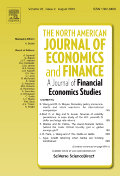
North American Journal of Economics and Finance
Bridging theory and practice in finance and economics.The North American Journal of Economics and Finance is a premier academic journal published by Elsevier Science Inc. since 1992, dedicated to advancing the field of economics and finance through rigorous research and scholarship. With an impressive impact factor and recognition in the Q2 category for Economics and Econometrics and Q1 for Finance as of 2023, this journal holds a significant position in the academic community, ranked #41 out of 317 in Finance and #100 out of 716 in Economics. The journal features high-quality, peer-reviewed articles that cover a broad range of topics, from theoretical frameworks to empirical analyses and practical applications. Though not an open-access platform, the journal provides valuable insights for researchers, practitioners, and students alike, promoting knowledge dissemination in the dynamic landscape of economic and financial studies. With its commitment to excellence, the North American Journal of Economics and Finance serves as an essential resource for those seeking to deepen their understanding of contemporary issues in these critical fields.

SIAM Journal on Financial Mathematics
Connecting Theory and Practice in Financial MathematicsThe SIAM Journal on Financial Mathematics, published by SIAM PUBLICATIONS, is a premier journal dedicated to the intersection of applied mathematics and finance. With an ISSN of 1945-497X, this journal serves as a vital platform for the dissemination of innovative research that addresses complex financial problems through mathematical modeling and analytical techniques. The journal has established itself within the Q2 quartile in the categories of Applied Mathematics, Finance, and Numerical Analysis, reflecting its influence and significance in these fields. Researchers and practitioners will find a wealth of knowledge spanning topics from stochastic calculus to quantitative finance, making it essential for anyone aiming to advance their understanding of financial mathematics. As the journal continues to converge from 2010 to 2024, it promises to remain a cornerstone resource for academics, professionals, and students alike, facilitating the ongoing dialogue between mathematics and its applications in the financial industry.
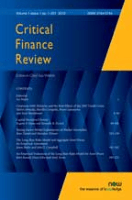
Critical Finance Review
Elevating financial research with innovative perspectives.Critical Finance Review is a premier academic journal dedicated to advancing the field of finance through the publication of high-quality research that spans various dimensions of the discipline. Published by NOW PUBLISHERS INC, this journal has quickly established itself as a leading source of innovative finance scholarship, achieving a notable Q1 classification in the 2023 finance category. Operating under a rigorous peer-review process, the journal ensures the academic integrity and relevance of its content, which attracts contributions from both emerging and established scholars. With an ISSN of 2164-5744 and E-ISSN 2164-5760, it is accessible to a global audience, though it operates under traditional access models. The journal welcomes a diverse range of topics including, but not limited to, risk management, financial markets, and quantitative finance, making it an essential resource for researchers, professionals, and students who are keen to explore the complexities of financial systems and develop new insights in the ever-evolving landscape of finance. Based in the United States, Critical Finance Review holds a significant position within the academic community, fostering a collaborative environment that encourages innovative thinking and practical applications of financial theories.

Algorithmic Finance
Advancing Knowledge in Algorithmic Financial PracticesAlgorithmic Finance, published by IOS PRESS, is a pivotal journal devoted to the burgeoning field of finance through the lens of computational methodologies. With its ISSN 2158-5571 and E-ISSN 2157-6203, the journal has been a platform for scholarly articles exploring the intricate interactions between algorithms and financial systems since its establishment in 2011. Although it currently resides in the Q4 quartile across several categories, including Computational Mathematics and Finance, it serves as a critical resource for researchers seeking to innovate within the financial landscape using algorithmic techniques. The journal is particularly relevant for an audience of academics, finance professionals, and graduate students, providing insights that combine quantitative analysis with economic theory. Located in Amsterdam, Netherlands, Algorithmic Finance aims to foster an interdisciplinary dialogue, making significant strides in the analytical approaches to financial markets while adhering to rigorous scientific standards. With its growing archive of research, the journal aspires to enhance the understanding of algorithmic strategies in finance, thereby encouraging further inquiry and application in real-world scenarios.
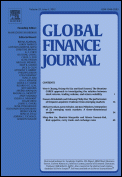
Global Finance Journal
Exploring the dynamics of economics and finance.Global Finance Journal is an esteemed periodical published by Elsevier, dedicated to the dynamic fields of finance and economics. With an impressive history spanning from 1989 to 2024, this journal holds a significant position in the academic community, boasting a Q1 quartile ranking in both Economics and Econometrics, as well as Finance, as of 2023. It is highly regarded in Scopus rankings, placing 40th out of 317 in Finance and 99th out of 716 in Economics and Econometrics, demonstrating its influence and reach among researchers and practitioners alike. Although not an open-access journal, the Global Finance Journal provides rigorous peer-reviewed articles that explore critical issues, advance theoretical frameworks, and address practical applications in global finance. As such, it serves as a vital resource for researchers, financial professionals, and students aiming to deepen their understanding of economic phenomena and contribute to the ongoing discourse in these vibrant disciplines.
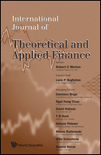
International Journal of Theoretical and Applied Finance
Elevating financial knowledge with rigorous scholarship.International Journal of Theoretical and Applied Finance is a distinguished publication in the field of finance, serving as a critical platform for the dissemination of innovative research and theoretical insights since its inception in 2003. Published by World Scientific Publishing Co Pte Ltd in Singapore, this journal boasts an impressive Q2 ranking in the realms of Economics, Econometrics, and Finance (miscellaneous) and a solid Q3 status in Finance for 2023. With a commitment to advancing knowledge in the complex world of theoretical frameworks and applied financial practices, it welcomes original research articles, comprehensive reviews, and case studies that explore varied facets of finance. Researchers, professionals, and students benefit from the journal's rigorous peer-review process and an ever-expanding repository of knowledge, making it an indispensable resource in the financial academic community. The journal does not currently offer open access, reflecting its selective approach to publishing high-quality content aimed at a specialized audience.

Journal of Computational Finance
Innovating risk management through computational excellence.Journal of Computational Finance, published by INCISIVE MEDIA, stands at the forefront of interdisciplinary research, amalgamating the realms of finance, applied mathematics, and computer science. With its ISSN 1460-1559 and E-ISSN 1755-2850, this journal provides a vital platform for scholars and practitioners alike, aiming to advance methodologies and computational techniques that enhance financial decision-making processes. Although currently categorized in the Q3 quartile across various disciplines—including Applied Mathematics, Computer Science Applications, and Finance—its commitment to quality research is unwavering, as evidenced by its curated selection of innovative studies. The journal’s scope includes computational modeling, algorithmic trading, risk management, and quantitative finance solutions. Each volume seeks to not only foster academic discourse but also bridge theoretical findings with practical applications in the financial industry. Given its convergence from 2011 to 2024, the journal continues to evolve alongside the rapidly changing financial landscape, supporting researchers, students, and professionals in navigating the complexities of computational finance.
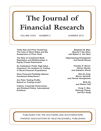
JOURNAL OF FINANCIAL RESEARCH
Pioneering Insights into Financial PracticesThe JOURNAL OF FINANCIAL RESEARCH, published by WILEY, stands as a pivotal platform for disseminating innovative research in the fields of finance and accounting since its inception in 1978. With an ISSN of 0270-2592 and an E-ISSN of 1475-6803, this journal aims to address contemporary challenges and trends within the financial research landscape. It has achieved notable recognition, being placed in the Q2 category for both Finance and Accounting in the 2023 rankings, signifying its relevance and impact within the academic community. Although it does not currently offer open access, the journal is accessible through various academic databases, catering to a diverse audience of researchers, professionals, and students keen on advancing their knowledge and understanding of financial systems and methodologies. With an evolving scope that encompasses empirical studies, theoretical frameworks, and practical applications, the JOURNAL OF FINANCIAL RESEARCH is committed to contributing valuable insights into the complexities of financial practices and policies.
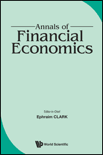
Annals of Financial Economics
Navigating the Complexities of Economics and FinanceAnnals of Financial Economics, published by World Scientific Publishing Co. Pte Ltd, is a premier scholarly journal catering to the fields of finance, economics, and international management. With an impressive impact factor and categorized in the Q2 quartile across multiple disciplines in the 2023 rankings, the journal holds a prominent position among its peers, evidenced by its ranking in the top 15% for Economics and Econometrics and Finance categories. The journal aims to foster high-quality, innovative research that addresses contemporary financial issues, making it a vital resource for researchers, professionals, and students alike. Although it does not operate under an open access model, it ensures that its contributions advance scientific discourse and provide valuable insights into financial theories, practices, and policies. With a historical publication span from 2005 to 2009 and again from 2011 to 2024, the Annals remains a critical platform for disseminating transformative ideas in financial economics, ensuring its relevance in a rapidly evolving scholarly landscape.
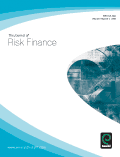
Journal of Risk Finance
Navigating the complexities of financial risk.The Journal of Risk Finance, published by Emerald Group Publishing Ltd, is a premier academic journal dedicated to advancing the understanding of risk management and finance practices since its inception in 1999. With a strong foothold within the Q2 rankings in both Accounting and Finance categories, it proudly holds a significant place in the scholarly landscape, ranking #54 out of 317 in the Scopus Economics and Finance category, placing it in the 83rd percentile. The journal aims to facilitate the exchange of innovative research and practical insights, catering to an audience of researchers, professionals, and students eager to explore contemporary issues in risk finance. While not an open access journal, it provides numerous access options, ensuring that essential findings reach a broad readership. Set in the United Kingdom and covering publications up to 2024, the Journal of Risk Finance continues to be an indispensable resource for those committed to this critical field.